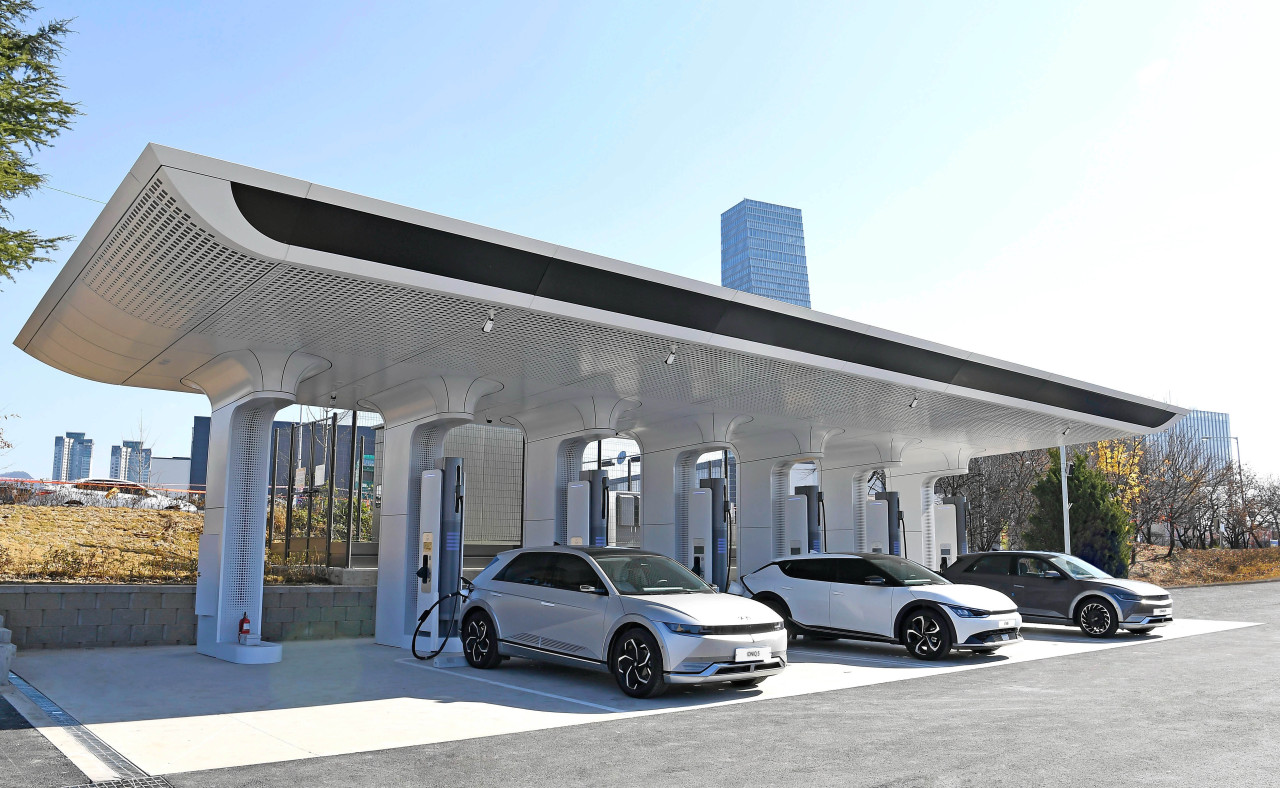
Registrations for electric vehicles jumped to 91,575 units, up 202.8 percent from the same period a year prior by November this year, data showed Monday, suggesting the quick expansion of their presence in the market.
Riding on the sustainability bandwagon, more than 100,000 electric vehicles were sold in South Korea and more than 150,000 domestic electric vehicles were exported as of this month, according to Carisyou Data Lab.
The Trade Ministry expects registrations to surpass 100,000 when December’s numbers are added.
The leading contributors to opening the new era of electric vehicles in South Korea were Hyundai Motors’ Ioniq5, Kia’s EV6 and Kona and Tesla.
From January to November this year, 20,956 units of Ioniq5 were sold, followed by 17,818 Tesla cars, 11,168 units of Kona and 9,045 EV6s.
Due to the fast growing market, automakers are actively developing electric vehicles. Next year, around 20 different electric models are expected to be sold in South Korea.
That includes South Korean carmaker Hyundai Motor Group’s Ioniq6, EV6 GT and Genesis G70 EV models.
Hyundai Motor announced last week that it aims to sell 220,000 electric vehicles around the world next year -- 56 percent more than they have sold this year.
GM Korea is expected to resume selling the Bolt EV and Bolt EUV, models that were delayed in distribution due to a recall over battery fire risks.
Renault Samsung Motors, currently selling the Renalt Zoe as its only electric model, is planning to produce environmentally friendly cars with Chinese carmaker Geely Auto in its Busan plant next year.
SsangYong Motors will introduce its Korando e-Motion within next year and Edison Motors, set to acquire SsangYong, is also expected to concentrate in developing electric vehicles instead of combustion engine cars.
Foreign carmakers are also focusing on launching electric vehicles in South Korea next year.
That includes Volvo’s C40 Recharge and CX40 Recharge, Mercedes-Benz’s EQE and EQB, BMW’s i4 and Polestar’s Polestar 2.
The new era of electric vehicles to come is also being backed by the South Korean government, which is putting efforts into popularizing eco-friendly cars in 2022.
The Moon Jae-in administration will use around 2 trillion won ($1.69 billion) from its budget next year to double the number of registered electric vehicles.
Likewise, the government aims to have up to 500,000 eco-friendly cars registered by next year through active investment in core technologies to develop sustainable cars.
Electric vehicle battery systems, hydrogen fuel cell systems, autonomous driving communication systems, automobile semiconductors and sensors and autonomous driving software development are six core technologies the government is investing in.
Riding on the sustainability bandwagon, more than 100,000 electric vehicles were sold in South Korea and more than 150,000 domestic electric vehicles were exported as of this month, according to Carisyou Data Lab.
The Trade Ministry expects registrations to surpass 100,000 when December’s numbers are added.
The leading contributors to opening the new era of electric vehicles in South Korea were Hyundai Motors’ Ioniq5, Kia’s EV6 and Kona and Tesla.
From January to November this year, 20,956 units of Ioniq5 were sold, followed by 17,818 Tesla cars, 11,168 units of Kona and 9,045 EV6s.
Due to the fast growing market, automakers are actively developing electric vehicles. Next year, around 20 different electric models are expected to be sold in South Korea.
That includes South Korean carmaker Hyundai Motor Group’s Ioniq6, EV6 GT and Genesis G70 EV models.
Hyundai Motor announced last week that it aims to sell 220,000 electric vehicles around the world next year -- 56 percent more than they have sold this year.
GM Korea is expected to resume selling the Bolt EV and Bolt EUV, models that were delayed in distribution due to a recall over battery fire risks.
Renault Samsung Motors, currently selling the Renalt Zoe as its only electric model, is planning to produce environmentally friendly cars with Chinese carmaker Geely Auto in its Busan plant next year.
SsangYong Motors will introduce its Korando e-Motion within next year and Edison Motors, set to acquire SsangYong, is also expected to concentrate in developing electric vehicles instead of combustion engine cars.
Foreign carmakers are also focusing on launching electric vehicles in South Korea next year.
That includes Volvo’s C40 Recharge and CX40 Recharge, Mercedes-Benz’s EQE and EQB, BMW’s i4 and Polestar’s Polestar 2.
The new era of electric vehicles to come is also being backed by the South Korean government, which is putting efforts into popularizing eco-friendly cars in 2022.
The Moon Jae-in administration will use around 2 trillion won ($1.69 billion) from its budget next year to double the number of registered electric vehicles.
Likewise, the government aims to have up to 500,000 eco-friendly cars registered by next year through active investment in core technologies to develop sustainable cars.
Electric vehicle battery systems, hydrogen fuel cell systems, autonomous driving communication systems, automobile semiconductors and sensors and autonomous driving software development are six core technologies the government is investing in.



















![[Today’s K-pop] Treasure to publish magazine for debut anniversary](http://res.heraldm.com/phpwas/restmb_idxmake.php?idx=642&simg=/content/image/2024/07/26/20240726050551_0.jpg&u=)